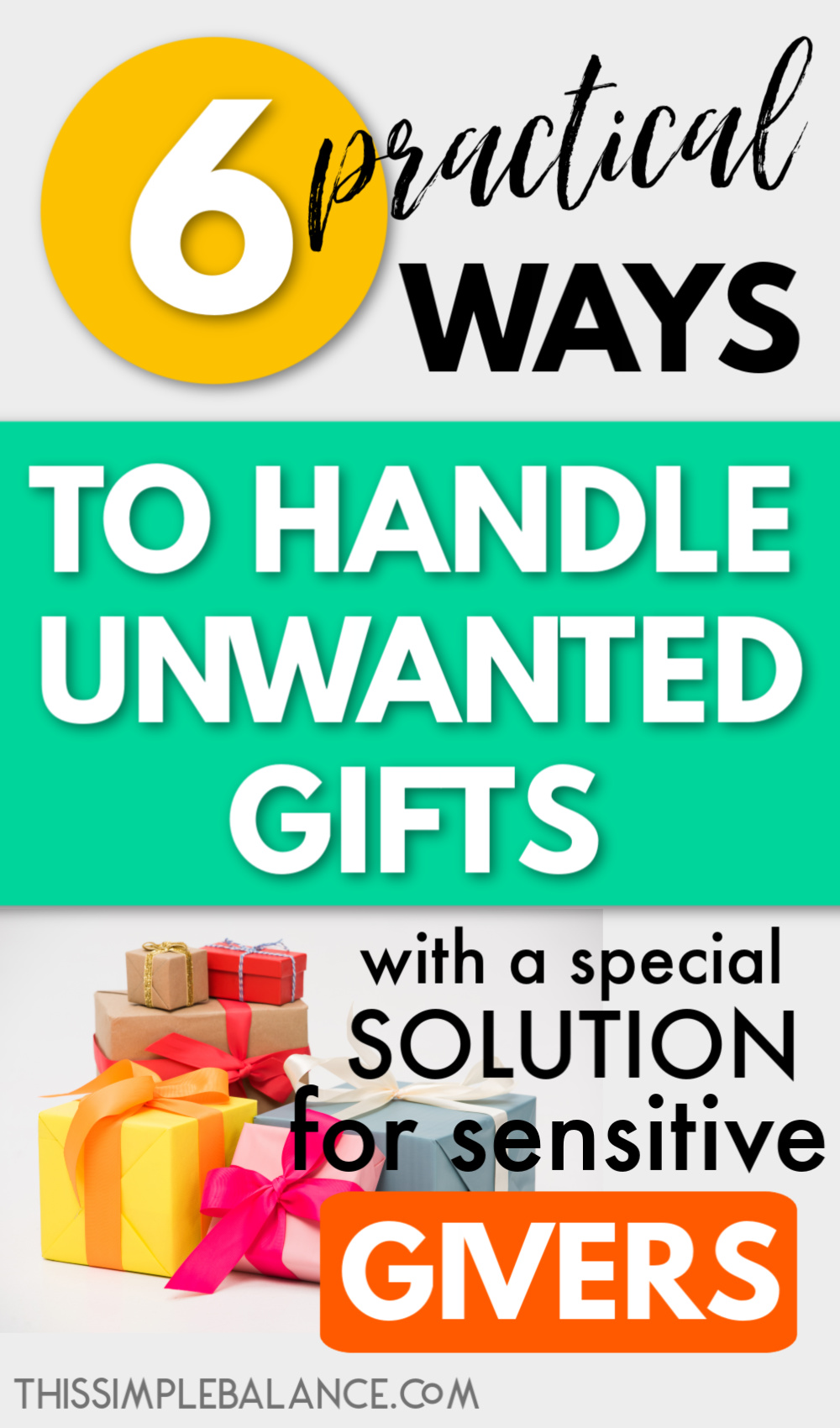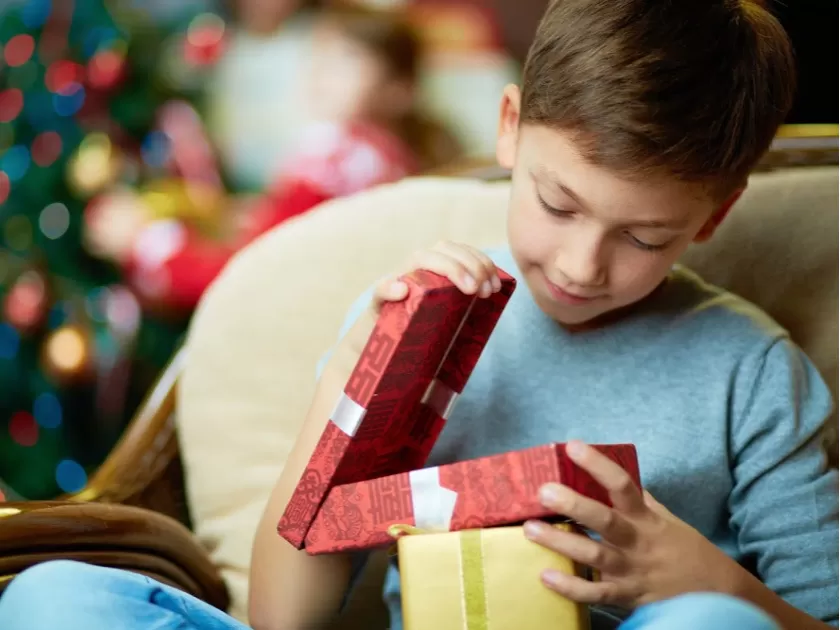Inside: Six practical options for dealing with unwanted gifts, plus the most important question to consider before you make a final decision.
The unfortunate side effect of a consumer-driven holiday season is unwanted gifts.
Especially when SO many people feel pressure to buy obligatory Christmas presents – think teacher gifts, secret Santa gift swaps, gifts for adult siblings who have long outgrown the gift-giving tradition – the likelihood that you’ll be on the receiving end of an unwanted gift is more likely than not.
Hopefully more and more people are starting to see the benefits of a minimalist Christmas.
Maybe it’s just the fact that I’m a minimalist, and the Facebook gods (a.k.a. the ever-changing algorithm) know what I love to see? But the more Facebook posts I see in my Facebook feed about the four-gift rule and experience gift ideas, the more hopeful I become.
It seems like the tide is turning as more families, in particular, are learning about the benefits of experience gifts and fewer gifts for kids in general.
They’re initiating uncomfortable, but necessary conversations with extended family about breaking the cycle of excessive gift-giving or worse, in my opinion, giving just because they think they should.
But while we wait for that bigger cultural shift to manifest, most of us are still going to be stuck dealing with those unwanted Christmas presents.
Boo.
Assuming you don’t want to end up like Emily Gilmore and her basement full of unwanted gifts from her mother-in-law, keep reading.
Related: How to Transition to a Minimalist Christmas with Kids
Who Gave You The Unwanted Gift?
THIS POST PROBABLY CONTAINS AFFILIATE LINKS. AS AN AMAZON ASSOCIATE, I EARN FROM QUALIFYING PURCHASES. YOU CAN READ OUR FULL DISCLOSURE POLICY HERE.
Figuring out what to do with unwanted gifts is complicated mainly by concern for the gift giver’s feelings.
So the first thing you need to consider is where the unwanted gift came from.
The way you handle unwanted Christmas presents from a close friend or family member is going to be quite different from the way you handle an unwanted gift you won during the White Elephant Gift Exchange from a random coworker you’ve barely said two words to the entire time you worked there.
Very different scenarios.
And I’m sure you’ve guessed which one requires more thought and tact?
Hopefully for the random co-workers, you’ll have no problem telling them you weren’t able to use the item and donated it. (If you struggle with this, get this book ASAP.)
However, before returning or donating an unwanted gift from a close friend or family member whose relationship you highly value, think about the personality of the gift-giver.
- Is gift-giving her love language?
- Have you shared your feelings about physical gifts with her? (If not, the sooner, the better.)
- Is she likely to ask about the gift later on?
If your family member is more of the dutiful gift giver, who gives gifts with gift receipts attached, you’re probably in the clear.
However, if you have the “gift-giving is my love language” friend or family member who you are close to and you’ve already tried to make known your feelings about clutter and unwanted gifts, you might consider keeping a small box for unwanted gifts.
I realize this is probably an unpopular and disputed opinion amongst minimalists, but after my father died unexpectedly, I’ve come to the conclusion that in select cases, the feelings of someone you love are far more important than getting one more thing out of your house.
The size of the box you choose sets a limit for the number of unwanted gifts you can reasonably keep. When it’s full, it’s full. (A great tip from one of my favorite decluttering books!)
If that person asks about the gift again and you did end up donating it, you can first thank them again for the gift. Next, explain that you either:
- Didn’t have room for it (small house anyone?), or
- Weren’t able to put it to good use and passed it along to someone who could.
If you are pursuing a minimalist lifestyle, make sure to explain that, too.
Above all else, be honest: you’re never going to stem the flow of unwanted gifts with deceit.
(i.e. Don’t be like Rachel with Ross’s Necklace 😂😂)
As long as you’re gracious and kind, the gift-giver will hopefully be able to swallow any hurt and honor how you feel about gifts in the future.
Ultimately, their feelings are their responsibility, not yours.
Related: The Right Way to Deal With Decluttering Guilt

Unwanted Gifts: 6 Practical Options
Here are several options I consider when I receive gifts I don’t need or want…
1. Return it to the store.
If the unwanted gift came with a gift receipt, this is an obvious move. You can exchange it for something you need.
OR you could use the store credit to purchase something for someone in need and donate that new item, instead.
Need ideas? Homeless shelters always need toiletries and socks. An easy, feel-good win!
2. Donate it.
Thrift stores are full of broken-down crap. Trust me, I frequent them.
Most thrift stores are non-profits and usually for a good cause. They could use brand new items that will sell for a decent price.
Additionally, the people who shop there could use a nicer selection of items they can get for less than full retail price.
You could also list the item in a Buy Nothing Group on Facebook or for free on Facebook Marketplace. That way you’re more certain the item is going to someone who truly wants/needs it.
3. Keep it for a while, then donate it.
This option works especially well for toys you wouldn’t have selected yourself and don’t want to keep long-term, but are happy to keep for a season.
After the initial month or two excitement of new toys, ask your kids if they would be o.k. passing them along to another child who will enjoy them as much as they did.
If you’ve established a minimalist family culture, this probably won’t be a problem.
If your kids are worried about Grandma or Aunt’s response to you decluttering their unwanted Christmas gifts (I have a sentimental child who struggles with this), you can try the unwanted gift box option, but emphasize it needs to stay in that child’s room/space.
If your child is old enough to worry about the gift-giver’s response, he/she is old enough to come to grips with the concept of space and unwanted items. This maintains your boundaries for a clutter-free family space, and helps the child understand how unused items takes up limited space.
You can also offer to have a conversation with Grandma or Aunt on their behalf so your child feels more comfortable passing along the unwanted item.
Whatever you do, explain that you need to keep a clutter-free family space, and help you children to navigate the issues associated with unwanted gifts with honesty and grace.
Related: How to Help Your Sentimental Child Declutter (when they want to keep it all)
4. Offer the unwanted gift back to the gift-giver.
Especially with sentimental people and handmade gifts, consider offering unwanted gifts back to the gift-givers before doing anything else.
Explain that while you are SO thankful they thought of you, you can’t find a place for those items in your home or won’t be able to use them enough to justify keeping them.
Most of all, their gift deserves to be used and loved instead of gather dust in a closet.
Sometimes, we think people are more attached to items than they actually are. They could care less, shrug, and tell you to pass it along to someone who will use it (then re-gift or donate it).
If it’s handmade, they may want to give it to someone who will use and love it.
Or they may want to keep it for themselves.
Either way, you are honoring them by being honest and involving them in the decision, even if it’s uncomfortable at first.
5. Re-gift it.
People can have some pretty strong opinions about re-gifting and whether or not it’s truly acceptable etiquette-wise.
Re-gifting doesn’t need to look like wrapping the present and giving it for a birthday or Christmas present, although you certainly can do that if you’re comfortable doing so. Re-gifting can look like giving it directly to a friend who you know will use and love it.
Think of re-gifting as specific donation.
I recommend saving this option for that random gift for a coworker rather than Grandma, though. You’re less likely to have an uncomfortable conversation later on.
And I think it goes without saying that you should definitely NOT re-gift or donate an heirloom. Just don’t do it (see the story below).
6. Keep a select few unwanted gifts long-term.
As I mentioned earlier, sometimes potentially ruining a close relationship isn’t worth it compared to the slight inconvenience of keeping a small item in a smallish box in your home long-term.
If you’ve done your due diligence with this particular gift-giver and they know you are being intentional about what you keep in your home, but they continue to give you unwanted gifts and are extremely hurt by the thought of you decluttering those gifts (think Great Grandma here), you can always designate a small box for those items.
If they ask about a particular gift and you donated it, thank them again and explain that while you were unable to keep that particular item, you did keep items XYZ (bring down the box).
Express your thanks again, and change the subject.
This isn’t the ideal scenario and should be used for very few people.
But sometimes getting rid of 1-2 unwanted items just isn’t worth jeopardizing the relationship, especially with immediate family. That’s just my opinion.
How to Avoid Unwanted Gifts in the Future
Honest conversations well before the holiday season are the best way to limit the number of unwanted gifts you receive. Think early November or earlier.
Those conversations should include:
1. You love the generous spirit of the gift-giver(s).
The last thing you want is to crush generosity.
While some may give out of obligation, the excessive gift givers usually have a truly generous spirit and love giving!
Make sure you express sincere admiration and appreciation for desire to be generous towards you and/or your kids.
2. Be honest about how clutter/stuff affects you.
If you haven’t shared about your decluttering/minimalist journey, now’s the time.
If clutter cause anxiety, tell them that. Explain why you decided to declutter and start living with less and the amazing benefits you’ve personally experienced.
If you explain the heart behind the desire for less stuff, you’re likely to get much farther with the unwanted gifts conversation.
3. Discuss ways to share gift ideas you do need or want.
Most minimalists, and people in general for that matter, aren’t anti-gifts. They just don’t want to deal with unwanted gifts that lead to cluttered homes and steal our time (plus the gift-giver’s money buying something you don’t want!)
You could create Amazon wishlists or send lists via e-mail.

One Last Thought on Unwanted Gifts
Before you go, let me tell you one last story about a clock – an unwanted gift I wish I’d handled differently.
That clock is why I put so much thought into what to do with unwanted gifts and why keeping them long-term is even an option for me.
The clock was a gift from my father-in-law, a kind, generous and thoughtful man who loves giving gifts.
It was a talking clock…every hour, on the hour, the clock would recite a Bible verse. My father-in-law has one in his own home and loved it so much, he wanted us to have one, too.
We kept it in my boys’ bedroom for several months. Eventually, in a regular decluttering round, they confessed to being done with the clock. We talked about how much we loved Grandpa and how thankful we were for his generosity (I’ve come a long way since the purple airplane incident).
Then out it went to the thrift store.
Not a big deal, right?
I didn’t think so. But imagine my horror when in a phone call a few weeks after that clock left our home, guess what my father-in-law asked about?
Yep. That talking clock.
Turns out he loved the clock so much he gave one to all of his kids. So everyone has one…except us.
Talk about feeling awful!
While my husband laughs it off, to this day I wish I had kept the clock. It didn’t need to stay front and center, but I wish I had kept it in a bin in the basement to pull out when he asked about it.
Especially in light of my father’s recent unexpected death, I see physical stuff with new eyes. There are things I don’t use regularly that I’m SO glad I didn’t declutter.
Had I known the clock meant that much to my father-in-law, that apparently it was a family heirloom of sorts, I would have certainly kept it.
Designating a small box for a few unwanted gifts isn’t that big of a deal.
And his joy at our keeping it would have been so worth it.
Read Next: 8 Tips for Decluttering on a Low Income


1 Comment